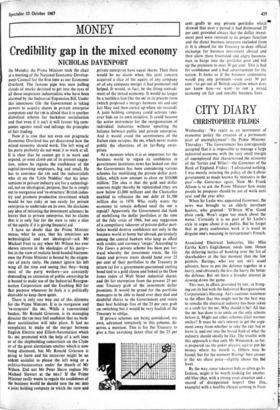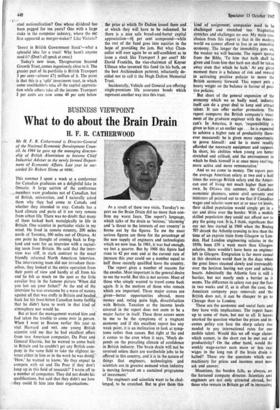CITY DIARY
CHRISTOPHER FILDES
Wednesday : 'We reject as an instrument of economic policy the creation of a permanent pool of unemployment'—the Prime Minister. Thursday : 'The Government has courageously accepted that it is impossible to manage a largo induStrial economy with the very small- margin of unemployed that characterised the economy of the 'forties and 'fifties'—the Governor of the Bank of England. Friday: 'I advocated nothing.- I was merely restating the policy of the Labour government as made known by ministers in the past'—the Governor again. Now Mr Frank Allaun is to ask the Prime Minister how many people he proposes should be out of work next year and the year after.
When Sir Leslie was appointed Governor, the news was brought to an elderly merchant banker, who grunted: 'O'Brien. H'm. Good plain cook. Won't argue too much about the menu.' Certainly it is no part of Sir Leslie's style to argue about it in public. But he forgot that in party conference week it is usual to disguise one's meaning in restaurateur's French.
Associated Electrical Industries, like Miss Eirtha Kitts Englishman, needs time. Hence the delaying tactics of handing over the list of shareholders at the last moment that the law permits. Barings, who are not AEI's usual advisers, have to put the defence together in a hurry, and obviously the less the hurry the better the defence. But AEI have a broader interest in slowing down the game.
This was, in effect, provided by GEC, in bring- ing out its bid with the Industrial Reorganisation Corporation's blessing. AEI's cautious statement to the effect that this might not be the best way to remake the electrical industry has been taken as a snub for the MC. Why should it be? All that the IRC has done is to smile on the only scheme before it. Might not other schemes elicit warmer smiles? It must be AEI's interest to get the argu- ment away from whether to take the GEC bid or leave it, and out into the broad field of what the industry should ideally be like. The trouble with this approach is that only Mr Weinstock, so far, is prepared (as the poker players say) to put his money where his mouth is. Others may be found; but for the moment Barings' best answer is the net share price—slightly above the bid level.
By the way, since takeover bids so often go by fashion, might it be worth looking for another old blue chip, with a strong asset situation and a record of disappointed hopes? One (fos,, example) with a healthy cheque coming in from
steel nationalisation? One whose dividend has been pegged for ten years? One with a large stake in the computer industry, where the IRC first appeared as merger-maker? Like Vickers?
`Invest in British Government Stock'—what a splendid idea for a trust! Why hasn't anyone used it? (Don't all speak at once.) Today's new issue, Throgmorton Secured Growth Trust, comes ingeniously close to it. The greater part of its portfolio is British Transport 3 per cent—almost £7-1 million of it. The point is that this is a 'split' investment trust, in which some stockholders take all the capital apprecia- tion while others take all the income. Transport 3 per cents are now some 40 per cent below the price at which Dr Dalton issued them and at which they will have to be redeemed. So there is a nice safe bread-and-butter capital appreciation-41 per cent compound—while the rest of the fund goes into equities in the hope of providing the jam. But what Chan- cellor will ever again be so self-confident as to issue a stock like Transport 3 per cent? Mr David Franklin, the vice-chairman of Keyser Ullman who invented this fund (in his bath, on the best Archimedean pattern), reluctantly de- cided not to call it the Hugh Dalton Memorial Trust.
Incidentally, Vehicle and General are offering single-premium life assurance bonds which represent another way into this trust.



































 Previous page
Previous page